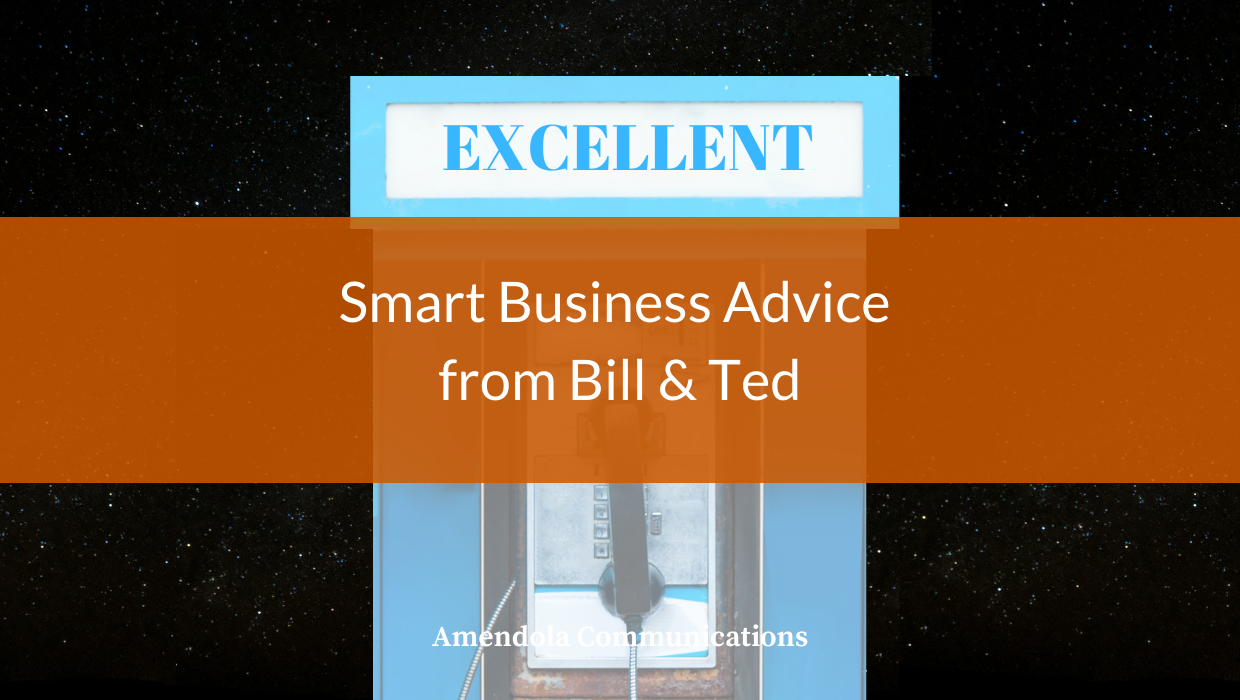Attention Bill & Ted fans! The news that Bill S. Preston, Esquire and Ted “Theodore” Logan will once again be gracing movie screens with a new film, Bill & Ted Face the Music, has certainly been met with tremendous excitement. Not the least of which is that much of the original cast is coming back.
Now, you can see why Alex Winter (Bill) would, since if I didn’t put it in here you’d probably have to look up who played him. But John Wick, I mean Keanu Reeves, coming back as Ted? Who woulda thunk it?
Yet as fun as it was to watch the dopey duo from San Dimas, California gallivant through time, space and the afterlife, underneath it all there was actually an important lesson that everyone in the business world should take time to remember:
No wait, that’s not it. This is it:
Except for that last part again.
All kidding aside, though, “Be excellent to each other” is tremendous advice. And it applies in so many ways – to the client/agency relationship, to the boss/employee relationship, and even your relationships with your peers.
What does it look like to follow the advice Bill & Ted so eloquently offered? It can be something as simple as saying “please” when you assign a task/give a deadline, or phrasing it in the form of a question (can you get that to me by the end of the day?) as well as “thank you” when it’s done. Even if whatever just got completed is in someone’s job description or your scope of work. A little appreciation, like a little hot sauce, can really go a long way.
Going along with saying “thank you” is remembering to tell someone they did a good job when that is the case. I’ve worked in places (not here at Amendola Communications, thankfully!) where the “good job” was more or less implied because if you didn’t do a good job (or someone perceived it wasn’t a good job) you absolutely would hear “This is (insert expletive here)!!!!” But that’s not the best approach to take.
Instead, say “I really like this” or “That’s great” or something else along those lines providing it’s true. If you like the work of your agency, co-workers, subordinates, bosses, etc. tell them so. Nothing gets people excited – and more willing to go the extra mile the next time – than to feel their hard work is appreciated. If you’re willing to tell someone what they did wrong, you should be willing to tell them when they did something right.
And no, this isn’t that Millennial thing where they require constant praise because they got participation trophies when they were children and it ruined them – a theory I don’t buy into at all based on the Millennials I know and work with. Don’t offer up false praise or else all praise is meaningless. But if you like what someone is doing, or what someone has done, be sure to share that information with them.
Another example of being excellent to each other is being respectful and realistic about deadlines. Some people like to assign short deadlines whether they need to or not because they want to check things off the list. Don’t be one of those.
If you don’t need something until Friday, give your agency or co-workers until Friday to get it done. If you do that consistently they may just surprise you and get it done early anyway. They’ll also be more willing to drop everything when you actually do have an unavoidable short deadline. But if they discover you’re asking for things on Tuesday and not even looking at them until Friday the anger and resentment is sure to build.
And, of course, there’s the whole talking behind people’s back thing. You don’t have to love everyone you come across to be decent to them. Remember that in a lot of cases you don’t really know their story, and what made them the way they are. You just see the stuff they let out in business, or in public.
If you have a real issue with someone (versus a minor, petty annoyance which we can all have from time to time and just have to learn to get over), try to talk to that person about it rather than mumbling about it to others. Maybe that person is unaware of particular habits or quirks and will benefit from the conversation. Or maybe they’ll be unreceptive, but at least you will have tried.
Always, though, keep in mind it’s not just that person. It’s also you and how you react to the person. Then think through which of those you can control and then do something about it. You may find things a bit less irritating, and find yourself able to be a little more excellent to that person.
These may all seem like little things. And they are to an extent. Yet it’s often the little things that make the biggest difference.
The world has always been a harsh place, and in the last few years it’s grown even harsher. The anonymity of the Internet has made it easier for people to be nasty to one another, and the speed and breadth of social media has enabled that meanness to be spread farther and faster than ever before.
Still, you have a choice. You can join the clatter of nasty, or you can follow the advice of Bill & Ted and be excellent to each other.
If we all just try to be a little better, and a little nicer, we can make the world – both the business world and the general world – a much better place.
So what did I miss? What other suggestions do you have that will help us all be excellent to each other? Please share your thoughts in the comments below.
